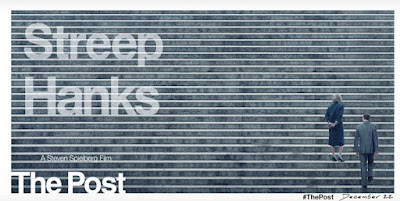The Post (Dir, Steven Spielberg, 1h, 56m)
Midway through The Post, the latest of Steven Spielberg's latter-career biographic dramas, a confrontation between Kay Graham (Meryl Streep, who walks an immaculate if fine line between charm and icy determination) and her fellow board members, culminating in her decision to publish the Pentagon Papers, risk jail, and expose the actions of Presidents she has counted among her personal friends, gives way to one of the best sequences that Spielberg has put to film in decades. It may not have the flashiness or spectacle of his earlier work, nor the drama of his more recent oeuvre, but in its simplicity-in the simple, beautifully shot setting, printing, and production of a newspaper-and the gravity of what that newspaper's headline and contents means, both to the Washington Post and Kay herself, gives the scene a rare, and breathtaking quality, only compounded by its repetition after the Post's victory at the end of the film. Alongside her, played to grumpy, if equally determined perfection, is Tom Hanks, as Ben Bradlee, her chief editor.
At its centre, The Post is a film about the freedom of the press, and equally important, about the government being accountable-both themes are clearly salient, not only from Spielberg's own statements, describing this as "a story I felt we needed to tell today", but also given the clear parallels that can be drawn between Nixon's paranoid administration-indeed, Nixon is never actually seen on camera, only in silhouette on the telephone-and the White House under Donald Trump.
Both men clearly are no fans of the press; Nixon's growling denouncement and banning of the Post from the White House (before Spielberg slyly sets up the Watergate scandal as a pre-credits sting), is not very far from Trump's own petulant "fake news" retort. Indeed, Trump's own spats with the Post in his primary campaign and subsequent run for the Presidency has given rise to the Post's new strap line of "Democracy Dies in Darkness"-not so very far from the idea that if Nixon is allowed to chip away at the Constitution once, he will continue to do so, and essentially muzzle the press
What Spielberg, as with Lincoln, thus does is to make a film that explores, and makes fresh, key elements of the United States Constitution-in this case, the very spirit and character of the First Amendment, of the freedom of the press, and freedom of speech, are laid bare, and discussed through several characters. Nixon is little more than a grim cypher, a symbol of a government deeply paranoid, heavy-handed and, even before the Watergate scandal hinted at the end of the film broke, clearly nefarious.
Around him, every other figure is, to a lesser or greater extent, focused on the freedom of the Post, from McNamara, the individual who initially collated the papers, intending them to be released to a future generations of historians, (who, when confronted by to the various journalists for the post who put their jobs, and indeed their liberty on the line, to the investors, who despite briefly floating into the "sniffy sceptic" stereotype that Spielberg occasionally overuses, are eventually brought onside.
When the Washington Post finally receives the judgement that lands it victory against Nixon, the film thus feels much more cathartic, the victory rightfully much larger than just a handful of newspapers against the government, but of freedom over tyranny-it may be Spielberg wearing his emotions on his sleeve, but it's an emotional climax that the film deserves, more than most.
This is not to say that The Post is a perfect film-the political positioning of the Post, close to a mouthpiece for the Kennedy and Johnson administrations is neatly smoothed over, the role of the New York Times severely reduced, and some of the less scrupulous elements of Ben Bradley toned down. Other elements, such as the Supreme Court, and the initial smuggling of the Pentagon Papers in and out of RAND, I feel could have been extended, or received more focus, although Spielberg's dramatic ratcheting up of tension throughout the film is perfectly paced, and may well have been defused by these changes.
Thus, The Post is that best kind of historical film-one that remains salient, whose message resonates as much today as it does in the retelling of the events-this is a film that, after all, comes at a point where the President of The United States wages a handheld (and like Nixon, utterly paranoid) war against the "Fake News" that criticise his divisive policies. This is a film that needed to be made now. It is also a film you simply need to watch
Rating: Must See.



Comments
Post a Comment